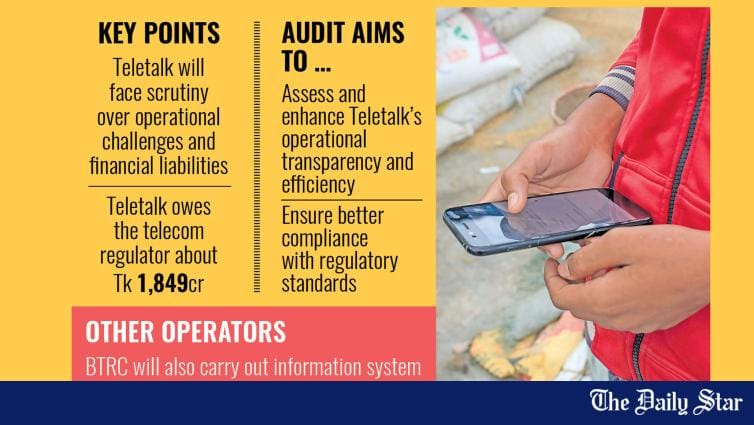Saif
Senior Member
- Joined
- Jan 24, 2024
- Messages
- 17,175
- Likes
- 8,163
- Nation

- Residence

- Axis Group


BTRC approves terms for auditing Teletalk
The Bangladesh Telecommunication Regulatory Commission (BTRC) has finalised key steps for auditing Teletalk, including setting goals, outlining the scope and detailing tasks for the process.
BTRC approves terms for auditing Teletalk

The Bangladesh Telecommunication Regulatory Commission (BTRC) has finalised key steps for auditing Teletalk, including setting goals, outlining the scope and detailing tasks for the process.
The telecom regulator recently approved the revised terms of reference (TOR), scope of service, expression of interest (EOI), and request for proposal (RFP) for appointing an auditor to conduct the operator's procedure and system audit.
The approval was granted during a recent commission meeting, following recommendations from the information system audit coordination committee, which reviewed and refined the documents.
For the first time, Teletalk, the only state-owned mobile network operator, will face scrutiny over operational challenges and financial liabilities.
According to the BTRC, Teletalk owes the telecom regulator about Tk 1,849 crore in unpaid licensing fees, revenue sharing, spectrum fees and contributions to the Social Obligation Fund.
In April 2024, a six-member committee was formed to draft the TOR, EoI and RFP in compliance with Public Procurement Rules 2008 and other government regulations.
The documents were ultimately finalised after a series of meetings and revisions.
This audit initiative aims to assess and enhance the operational transparency and efficiency of Teletalk, ensuring better compliance with regulatory standards, according to an official of the BTRC.
The telecom regulator has also decided to carry out information system audits on Grameenphone and Robi Axiata in the years since 2015, and form committees to start the process of appointing auditors.
The decision to carry out the audits comes even though the claims of the first audits into the operators have not been settled yet.
The telecom regulator ran separate audits on the two operators from their inception to December 2014 and claimed Tk 12,579 crore from Grameenphone and Tk 867 crore from Robi.
The claims include the amounts for unpaid annual spectrum fees, value-added tax and revenue sharing. However, both operators disputed the sum and claimed that they did not evade any taxes.
The dispute triggered a legal battle between the operators and the BTRC, with the companies filing lawsuits in 2019.
Based on the audit of Grameenphone from 1997 to 2014, the BTRC sent a demand notice in April 2019, asking it to clear the payments.
Later, Grameenphone filed a case before the district court against the claim. The Supreme Court in November that year ordered the operator to give Tk 2,000 crore in three months to the commission.
Afterward, the appellate division directed the largest mobile network operator in the country to deposit Tk 1,000 crore by February 2020 and another Tk 1,000 crore by May 2020. Grameenphone complied.
Of the Tk 12,579 crore, the operator has not yet cleared the more than Tk 6,100 crore slapped as late fees.
Additionally, as of April this year, it paid more than Tk 2,392 crore out of Tk 4,085 crore owed to the National Board of Revenue.
Out of Tk 867 crore, Robi, the second-largest operator of Bangladesh, paid Tk 138 crore in five instalments by May 2020 to comply with the order of the High Court Division.
The telecom regulator also conducted audits on Banglalink from 1996 to 2019 and asked the operator to pay more than Tk 820 crore last year.
It has already paid a principal amount of Tk 390 crore in instalments, according to an official of the operator.
Banglalink is trying to mutually resolve the BTRC's audit outcome while Grameenphone has already initiated negotiations regarding late fees as both parties seek an out-of-court settlement on the matter.
The Bangladesh Telecommunication Regulatory Commission (BTRC) has finalised key steps for auditing Teletalk, including setting goals, outlining the scope and detailing tasks for the process.
The telecom regulator recently approved the revised terms of reference (TOR), scope of service, expression of interest (EOI), and request for proposal (RFP) for appointing an auditor to conduct the operator's procedure and system audit.
The approval was granted during a recent commission meeting, following recommendations from the information system audit coordination committee, which reviewed and refined the documents.
For the first time, Teletalk, the only state-owned mobile network operator, will face scrutiny over operational challenges and financial liabilities.
According to the BTRC, Teletalk owes the telecom regulator about Tk 1,849 crore in unpaid licensing fees, revenue sharing, spectrum fees and contributions to the Social Obligation Fund.
In April 2024, a six-member committee was formed to draft the TOR, EoI and RFP in compliance with Public Procurement Rules 2008 and other government regulations.
The documents were ultimately finalised after a series of meetings and revisions.
This audit initiative aims to assess and enhance the operational transparency and efficiency of Teletalk, ensuring better compliance with regulatory standards, according to an official of the BTRC.
The telecom regulator has also decided to carry out information system audits on Grameenphone and Robi Axiata in the years since 2015, and form committees to start the process of appointing auditors.
The decision to carry out the audits comes even though the claims of the first audits into the operators have not been settled yet.
The telecom regulator ran separate audits on the two operators from their inception to December 2014 and claimed Tk 12,579 crore from Grameenphone and Tk 867 crore from Robi.
The claims include the amounts for unpaid annual spectrum fees, value-added tax and revenue sharing. However, both operators disputed the sum and claimed that they did not evade any taxes.
The dispute triggered a legal battle between the operators and the BTRC, with the companies filing lawsuits in 2019.
Based on the audit of Grameenphone from 1997 to 2014, the BTRC sent a demand notice in April 2019, asking it to clear the payments.
Later, Grameenphone filed a case before the district court against the claim. The Supreme Court in November that year ordered the operator to give Tk 2,000 crore in three months to the commission.
Afterward, the appellate division directed the largest mobile network operator in the country to deposit Tk 1,000 crore by February 2020 and another Tk 1,000 crore by May 2020. Grameenphone complied.
Of the Tk 12,579 crore, the operator has not yet cleared the more than Tk 6,100 crore slapped as late fees.
Additionally, as of April this year, it paid more than Tk 2,392 crore out of Tk 4,085 crore owed to the National Board of Revenue.
Out of Tk 867 crore, Robi, the second-largest operator of Bangladesh, paid Tk 138 crore in five instalments by May 2020 to comply with the order of the High Court Division.
The telecom regulator also conducted audits on Banglalink from 1996 to 2019 and asked the operator to pay more than Tk 820 crore last year.
It has already paid a principal amount of Tk 390 crore in instalments, according to an official of the operator.
Banglalink is trying to mutually resolve the BTRC's audit outcome while Grameenphone has already initiated negotiations regarding late fees as both parties seek an out-of-court settlement on the matter.






































